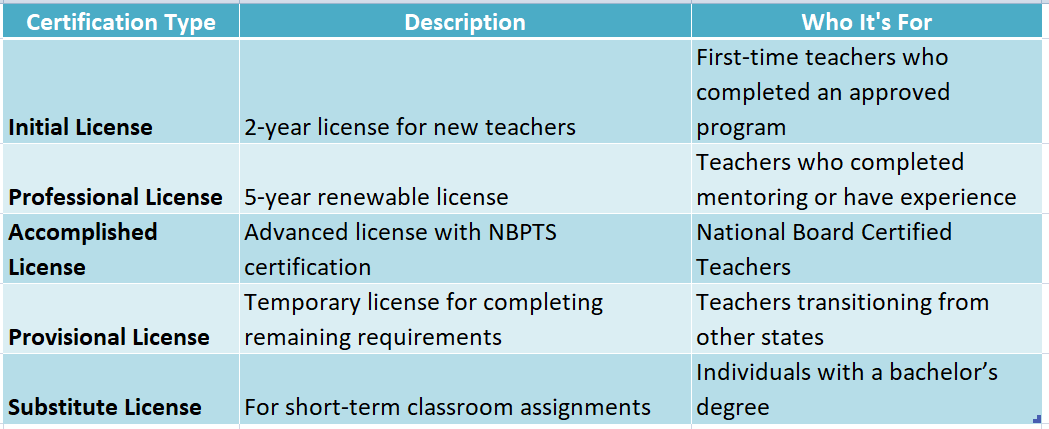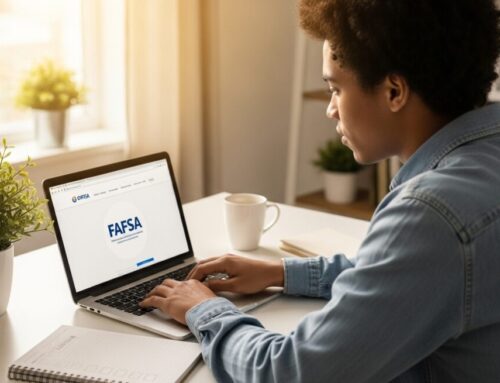
Understanding the requirements for Kansas teacher certification is crucial for anyone aspiring to become an educator in the Sunflower State. Whether you’re a recent graduate or looking to switch careers, knowing what it takes to obtain your kansas teacher certification can set you on the right path. Let’s dive into the essentials!
Basic Requirements for Kansas Teacher Certification
To earn your kansas teacher certification, you typically need to meet several key requirements. Here’s a quick overview:
- Educational Background: A bachelor’s degree in education or a related field is essential.
- Teacher Preparation Program: Completing an accredited teacher preparation program is a must.
- Examinations: Passing the required exams, such as the Praxis, is necessary to demonstrate your teaching skills.
Additional Steps to Consider
Once you’ve met the basic requirements, there are a few more steps to take:
- Background Check: A criminal background check is required to ensure the safety of students.
- Application Process: Submit your application through the Kansas State Department of Education.
- Teaching Certification Online: If you’re busy, consider pursuing your teaching certification online, which offers flexibility and convenience.
In summary, understanding these requirements is the first step toward a rewarding career in teaching. With the right preparation, you can achieve your goal of obtaining your kansas teacher certification and making a difference in students’ lives!
Start your journey to a brighter future—Enroll now!
What Are the Educational Requirements for Kansas Teacher Certification?

Getting a Kansas teacher certification is an important step for anyone looking to inspire young minds in the classroom. Understanding the educational requirements can help you navigate the path to becoming a certified teacher. So, what exactly do you need to achieve this goal?
To earn your Kansas teacher certification, you must complete several key educational steps. Here’s a simple breakdown:
1. Obtain a Bachelor’s Degree
You need a bachelor’s degree from an accredited college or university. This degree should ideally be in education or a related field. If you’re considering teaching certification online, many programs offer flexible options to fit your schedule.
2. Complete a Teacher Preparation Program
Next, you must complete a teacher preparation program. This program includes coursework and practical teaching experiences. It’s designed to equip you with the skills needed to manage a classroom effectively.
3. Pass Required Exams
You’ll also need to pass specific exams, like the Praxis tests, which assess your knowledge in teaching. These exams ensure you are ready to teach in Kansas schools. Remember, if you hold an OK teacher certification, you may need to meet additional requirements to teach in Kansas.
How to Pass the Required Exams for Kansas Teacher Certification?
Getting your Kansas teacher certification is an exciting journey! It opens doors to a fulfilling career in education. But before you can step into the classroom, you need to pass some important exams. Understanding these requirements is crucial for your success as a future teacher.
Know the Exams You Need to Take
To earn your Kansas teacher certification, you must pass specific exams. These typically include the Praxis series, which tests your knowledge in various subjects. Make sure to check the latest requirements, as they can change!
Prepare Effectively
Here are some tips to help you prepare for your exams:
- Study Regularly: Set aside time each day to review materials. Consistency is key!
- Use Online Resources: Consider taking a teaching certification online course. These can provide valuable insights and practice tests.
- Join Study Groups: Collaborating with peers can make studying more enjoyable and effective. You can share tips and quiz each other!
Practice Makes Perfect
Finally, practice is essential. Take as many practice tests as you can. This will help you get comfortable with the exam format and timing. Remember, passing these exams is a significant step toward your teaching career, whether you’re aiming for Kansas teacher certification or even exploring options like ok teacher certification.
What Background Checks Are Necessary for Kansas Teacher Certification?
When considering a career in education, understanding the requirements for Kansas teacher certification is crucial. One key aspect of this process involves background checks, which ensure that teachers are safe and trustworthy individuals. Let’s dive into what these checks entail and why they matter.
To obtain your Kansas teacher certification, you must undergo several background checks. These checks are designed to protect students and maintain a safe learning environment. Here are the main components:
Fingerprinting
- All prospective teachers must submit to fingerprinting. This helps identify any criminal history that could affect your eligibility.
Criminal History Check
- A thorough criminal history check is conducted. This includes a review of any felonies or misdemeanors that may disqualify you from teaching.
Child Abuse Registry Check
- You’ll also need to be cleared through the Child Abuse Registry. This ensures that you have no history of child abuse or neglect, which is vital for maintaining student safety.
Completing these background checks is a necessary step in obtaining your teaching certification online. It’s important to be honest and upfront during this process. Remember, the goal is to create a safe and nurturing environment for all students, which is why these checks are taken seriously.
Start your journey to a brighter future—Enroll now!
Are There Alternative Pathways to Kansas Teacher Certification?
When considering a career in education, understanding the requirements for Kansas teacher certification is crucial. Many aspiring teachers wonder if there are alternative pathways to achieve this certification. This is important because not everyone follows the traditional route, and knowing your options can help you find the best fit for your situation.
In Kansas, there are several alternative pathways to obtain your teaching certification. Here are some options you might consider:
- Alternative Licensure Programs: These programs allow individuals with a bachelor’s degree in a non-education field to pursue teaching certification. They often include coursework and supervised teaching experiences.
- Teaching Certification Online: Many universities offer online programs that can help you earn your Kansas teacher certification while balancing other commitments. This flexibility can be a game-changer for busy adults.
- OK Teacher Certification: If you hold a teaching certification from Oklahoma, you may be eligible for reciprocity in Kansas.
This means you could transfer your certification without starting from scratch. Exploring these alternative pathways can make the dream of becoming a teacher more accessible. Whether you’re looking for online options or leveraging existing certifications, there are multiple routes to help you achieve your Kansas teacher certification.
How Can Degreesonline.education Support Your Kansas Teacher Certification Journey?
Getting your Kansas teacher certification is an important step toward a rewarding career in education. Understanding the requirements can feel overwhelming, but it’s essential for aspiring teachers. Whether you’re just starting or looking to switch careers, knowing what you need can make the process smoother and more enjoyable.
At Degreesonline.education, we’re here to guide you through the Kansas teacher certification process. Here’s how we can help:
Step-by-Step Guidance
- Understand Requirements: We break down the specific requirements for Kansas teacher certification, so you know exactly what to expect.
- Teaching Certification Online: Explore our online resources that provide valuable information and courses to help you prepare for your certification exams.
- Support for Out-of-State Teachers: If you hold an OK teacher certification, we can assist you in understanding how to transfer your credentials to Kansas.
Resources and Tools
- Interactive Checklists: Use our checklists to track your progress and ensure you meet all requirements.
- Expert Advice: Our team of experienced educators is available to answer your questions and provide personalized support.
Community Support
- Join a Network: Connect with other aspiring teachers through our community forums. Share experiences and tips!
- Workshops and Webinars: Participate in our online workshops to learn more about the certification process and teaching strategies.
Staying Updated: Continuing Education Requirements for Kansas Teacher Certification
Staying updated with the latest requirements for Kansas teacher certification is crucial for aspiring educators. As the education landscape evolves, so do the standards for teaching. Understanding these requirements ensures that you remain qualified and effective in the classroom, ultimately benefiting your students.
To maintain your Kansas teacher certification, you must engage in ongoing professional development. This helps you stay current with teaching methods and educational technology. Here are some key points to consider:
Key Continuing Education Requirements
- Credit Hours: Teachers must complete a specific number of professional development hours every five years.
- Approved Courses: Courses can be taken through accredited institutions or online platforms, making it easier to pursue teaching certification online.
- Workshops and Conferences: Participating in educational workshops and conferences can also count towards your required hours.
By fulfilling these requirements, you not only keep your certification valid but also enhance your teaching skills. This is especially important if you are considering moving to another state, like Oklahoma, where you might need to meet additional criteria for ok teacher certification.
In summary, staying updated with continuing education requirements is essential for Kansas teacher certification. It ensures that you remain a competent and knowledgeable educator, ready to inspire your students. So, whether you choose traditional courses or opt for teaching certification online, make sure to prioritize your professional growth!
Start your journey to a brighter future—Enroll now!
FAQs
1. How do I become a certified teacher in Kansas?
You need a bachelor’s degree, completion of a teacher preparation program, passing required exams, and an application through the Kansas State Department of Education (KSDE).
2. What types of teaching licenses are available?
Kansas offers Initial (2 years), Professional (5 years), Substitute, and Reciprocal licenses for out-of-state teachers.
3. What exams are required?
Most applicants must pass Praxis Subject Assessments and the Principles of Learning and Teaching (PLT) exam.
4. Can I use an out-of-state teaching license in Kansas?
Yes, Kansas offers license reciprocity. You may need to meet some Kansas-specific requirements.
5. How long is a Kansas teaching license valid?
Initial licenses are valid for 2 years; Professional licenses are valid for 5 years and are renewable.
6. How do I apply for a teaching license?
Apply online through the KSDE licensure portal, submit required documents, and pay the processing fee.




